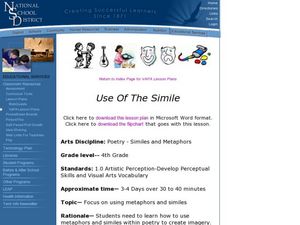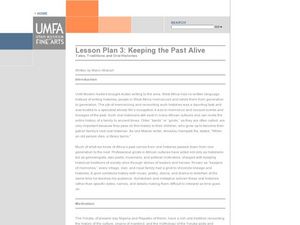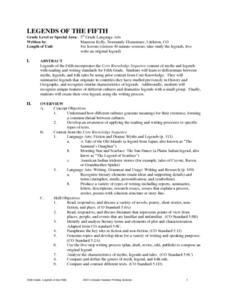Curated OER
Use of the Simile
Fourth graders identify and write their own similes. In this literary devices lesson, 4th graders define and identify similes. The teacher scaffolds the lesson so that all students can write their own similes.
Curated OER
Analysis of Character in a Short Story
Ninth graders examine a character from the short story, John Steinbeck's, "Flight." students respond to questions about the story and illustrate the character's journey.
Curated OER
Recognizing Similies: Fast as a Whip
Students review what they have already learned about similies and begin to engage with similies on a deeper and more abstract level as they create their own.
Curated OER
The Highwayman
Fifth graders re-read the story "The Highwayman" understanding the term "narrative verse". As a paired activity, they predict who or what might be the audience and provide feedback.
Curated OER
Original Line or Familiar Find?
Young scholars examine a primary source document from 1684 that includes many of the same lines found in Romeo's speech to Juliet from Shakespeare's Romeo and Juliet. Students compare the texts and discuss authorship during the sixteenth...
Curated OER
Comparing Characters Across Two Short Stories
Ninth graders listen to a read aloud of two short stories focusing on literary devices. The write about the settings and realism of the stories, and decide each main character handles the conflict he faces with nature.
Curated OER
Keeping the Past Alive
Students read about the oral histories of West Africa and complete related activities. In this oral histories lesson, students read about the importance of oral customs in African cultures. Students interview a family member about oral...
Curated OER
Alliteration
Students write and illustrate a sentence which names a letter of the alphabet. The sentence should have subject, verb, describing words, and incorporate alliterative techniques.
Curated OER
Technology-commected Folklife Lesson Plan: Fables
Students discuss ways the stories were alike and different. The teacher demonstrate how to draw a Venn diagram using Microsoft Word. They label the two circles and enter the likenesses and differences on the diagram.
Curated OER
Legends of the Fifth
Fifth graders discover the difference between myths, legends, and folk tales. They summarize legends. They work together to dramatize legends and then create their own legend using the writing process. Handouts and worksheets are included.
Curated OER
VH1 Driven: Kanye West, Lesson 2
Young scholars compose an original rap. They discuss the career and music of Kanye West, discuss their pre-writing worksheet, and write an original rap using a Final Draft Worksheet.
Curated OER
Human Rights/Civil Rights
Students connect their examination of the novel Roll of Thunder, Hear My Cry to a historical and contemporary study of the issue of human rights and civil rights by creating a HyperStudio stack.
Curated OER
Using Scholastic News to Introduce the Net
Third graders log on to the net, type in the address for Scholastic and browse the subjects for the week. They select one area of interest and generate five interesting facts about the article.
Curated OER
Exploring Alaska Foilage In Russian
Seventh graders investigate the concepts of how plants are part of daily culture in Russia. The skills of naming different plants is practiced. Students take a survey of the nature that is found in the area in which they live. This is...
Curated OER
Proverbs
Students examine the origins of proverbs and examine several examples. Then they create their own collection of existing proverbs. Later they write their own original ones and share with the class.
Other popular searches
- Simile and Metaphor Poems
- Month Metaphor Poems
- 2nd Grade Metaphor Poems
- Death Poems Metaphor
- War Metaphor Poems
- Extended Metaphor Poems
- Implied Metaphor Poems
- Sample Metaphor Poems
- Esl Metaphor Poems
- Halloween Metaphor Poems
















